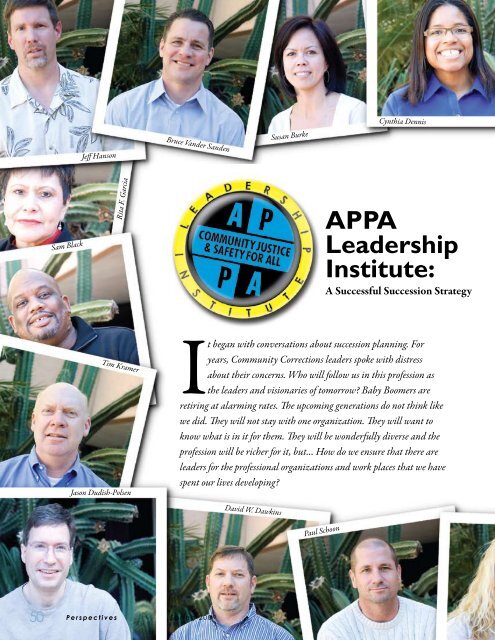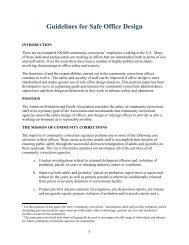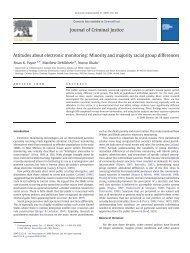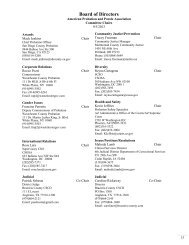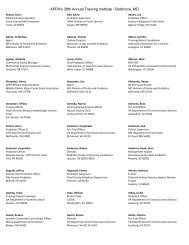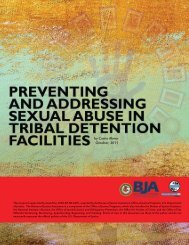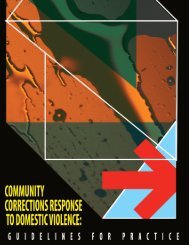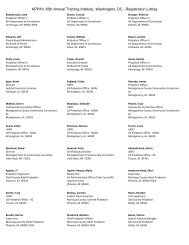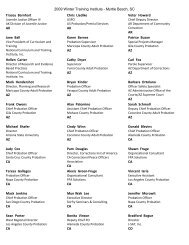APPA Leadership Institute: - American Probation and Parole ...
APPA Leadership Institute: - American Probation and Parole ...
APPA Leadership Institute: - American Probation and Parole ...
You also want an ePaper? Increase the reach of your titles
YUMPU automatically turns print PDFs into web optimized ePapers that Google loves.
Bruce V<strong>and</strong>er S<strong>and</strong>en<br />
Susan Burke<br />
Cynthia Dennis<br />
Jeff Hanson<br />
Sam Black<br />
Rita F. Garcia<br />
<strong>APPA</strong><br />
<strong>Leadership</strong><br />
<strong>Institute</strong>:<br />
A Successful Succession Strategy<br />
Tim Kramer<br />
Jason Dudish-Polsen<br />
It began with conversations about succession planning. For<br />
years, Community Corrections leaders spoke with distress<br />
about their concerns. Who will follow us in this profession as<br />
the leaders <strong>and</strong> visionaries of tomorrow Baby Boomers are<br />
retiring at alarming rates. The upcoming generations do not think like<br />
we did. They will not stay with one organization. They will want to<br />
know what is in it for them. They will be wonderfully diverse <strong>and</strong> the<br />
profession will be richer for it, but… How do we ensure that there are<br />
leaders for the professional organizations <strong>and</strong> work places that we have<br />
spent our lives developing<br />
David W. Dawkins<br />
Paul Schoon<br />
50<br />
Perspectives Spring 2009
Andrea Martin<br />
Greg Fitzpatrick<br />
Ann Beranis<br />
Alan M. Palomino<br />
“From a personal perspective, I enjoyed being a coach. From a work perspective,<br />
we would have never had a vision/mission statement if it were not for your project.<br />
From an <strong>APPA</strong> perspective, there is no question that your class has engaged in the<br />
<strong>APPA</strong> process of committee work <strong>and</strong> Board of Director service. For these reasons,<br />
I have felt very strongly that we continue to offer the <strong>Leadership</strong> Development<br />
program <strong>and</strong> improve upon a successful first session.”<br />
Ray Wahl, Utah Juvenile Court Administrator<br />
Erika L. Preuitt<br />
For several years, this has been the discussion<br />
– the large number of leaders in community<br />
corrections <strong>and</strong> allied professional<br />
organizations that are leaving the work force<br />
at the same time. As the baby boomers reach<br />
retirement age, much of the history <strong>and</strong> experience<br />
in the community corrections industry<br />
could be gone, simultaneously, from<br />
agencies across the country. The passion for<br />
volunteering outside of the workplace <strong>and</strong><br />
professional networking is waning with new<br />
generations skillful <strong>and</strong> comfortable with<br />
electronic communications. Email, internet<br />
<strong>and</strong> blackberrys make us readily available<br />
but do not always encourage face to face<br />
communications or close relationships.<br />
<strong>APPA</strong> Past President Mark Carey, acknowledging<br />
this professional dilemma,<br />
appointed an ad hoc committee to discuss<br />
possible strategies for bridging the gap.<br />
<strong>APPA</strong> <strong>and</strong> other volunteer organizations<br />
were struggling with waning membership.<br />
The younger generations in the work force<br />
did not join professional organizations as<br />
readily. Similarly, agencies are looking at<br />
their bench strength <strong>and</strong> wondering how<br />
to best prepare the work force for the roles<br />
that they will step into as they move toward<br />
executive leadership.<br />
From this as hoc committee a proposal<br />
was made: Create a <strong>Leadership</strong> <strong>Institute</strong><br />
that will prepare future executive leaders,<br />
Rhonda Rhodes<br />
John Bruner<br />
Jim Duque<br />
Dana Cormany<br />
Sarah Schmoll<br />
Bridget Guzman<br />
<strong>American</strong> <strong>Probation</strong> <strong>and</strong> <strong>Parole</strong> Association 51
The following are questions asked of two of the<br />
participants, Susan Burke, Assistant Juvenile Court<br />
Administrator, Utah Administrative Office of the<br />
Courts <strong>and</strong> Sarah Schmoll, Deputy Chief <strong>Probation</strong><br />
Officer, Coconino County, State Of Arizona in<br />
regards to their participation in the first <strong>APPA</strong><br />
<strong>Leadership</strong> <strong>Institute</strong>.<br />
What is your overall opinion of the <strong>Leadership</strong><br />
<strong>Institute</strong><br />
Susan:<br />
Having worked in the justice field for 18 years now,<br />
I thought I knew what it took to be a good leader. I<br />
had observed both good <strong>and</strong> bad leaders. I knew what<br />
characteristics I wanted to emulate <strong>and</strong> which ones I did not<br />
want to follow. The <strong>APPA</strong> <strong>Leadership</strong> <strong>Institute</strong>, however, had<br />
me questioning what I knew, introduced me to new concepts<br />
about leadership, <strong>and</strong> ultimately helped me put into action<br />
some changes. The <strong>APPA</strong> <strong>Leadership</strong> <strong>Institute</strong> is the only one of<br />
its kind that focuses on developing future leaders in the area<br />
of probation <strong>and</strong> parole by using experts from the field. The<br />
program was definitely worth the time <strong>and</strong> expense.<br />
Sarah:<br />
Participation in the <strong>APPA</strong> <strong>Leadership</strong> <strong>Institute</strong> was an<br />
incredible experience. In addition to great classroom training,<br />
the <strong>Institute</strong> provided the opportunity to network with many<br />
of the most recognized leaders in the field <strong>and</strong> a chance to<br />
bond with many of my peers from across the country. On a<br />
personal note, the biggest benefit was meeting great people<br />
who share common interests. Today, I know I can pick up the<br />
phone to chat about issues of mutual concern with up <strong>and</strong><br />
coming leaders, as well as any of the expert faculty <strong>and</strong> my<br />
assigned coach.<br />
How do you believe this program benefited you <strong>and</strong><br />
your agency<br />
Susan:<br />
I have benefited personally <strong>and</strong> professionally from my<br />
participation in the <strong>Leadership</strong> <strong>Institute</strong>. I gained a lot of<br />
insight into my strengths as a leader <strong>and</strong> have identified areas<br />
that need additional attention. I also gained a new perspective<br />
about leadership <strong>and</strong> how to cultivate it at all levels of my<br />
organization. I have personally benefited from the friendships<br />
I have developed <strong>and</strong> look forward to maintaining them<br />
throughout my career <strong>and</strong> beyond.<br />
<strong>and</strong> assist them in developing a passion for volunteering <strong>and</strong><br />
networking within the profession. Thus the <strong>APPA</strong> <strong>Leadership</strong><br />
<strong>Institute</strong> was born. Quickly, partners came on board: the Correctional<br />
Management <strong>Institute</strong> of Texas at Sam Houston State<br />
University (CMIT), the National Association of <strong>Probation</strong><br />
Executives (NAPE), <strong>and</strong> the National <strong>Institute</strong> of Corrections<br />
(NIC). Additionally, the Past Presidents of <strong>APPA</strong> pledged their<br />
active support.<br />
The commitment of the partners was strong. It was<br />
unanimously believed that creation of the <strong>Institute</strong> was critical<br />
<strong>and</strong> the timing was right. During the discussions, the steering<br />
committee laid out four specific goals around which to develop<br />
the <strong>Institute</strong>.<br />
• Provide participants with a fundamental underst<strong>and</strong>ing of<br />
leadership <strong>and</strong> management within the community corrections<br />
arena.<br />
• Increase participants’ critical thinking skills <strong>and</strong> analytical<br />
abilities to sustain the increasing dem<strong>and</strong>s of leadership <strong>and</strong><br />
management <strong>and</strong> to further develop the leadership capacity<br />
for organizational change.<br />
• Develop participants’ skills for navigating through various<br />
levels of the political system in organizations, including organizational<br />
units, <strong>and</strong> sub-service delivery systems to advance<br />
the objectives of community corrections.<br />
• Enhance participant’s professional growth through sustained<br />
interaction with a national network of community corrections<br />
leaders, managers, <strong>and</strong> executives.<br />
The curriculum design team along with curriculum<br />
specialists from CMIT <strong>and</strong> funding from NIC outlined the<br />
core curriculum. The design team left CMIT with additional<br />
assignments for themselves <strong>and</strong> other members of the steering<br />
committee but with the knowledge that a very impressive <strong>and</strong><br />
exciting program had emerged from the thoughts <strong>and</strong> dreams<br />
exchanged between the community corrections professionals<br />
<strong>and</strong> the higher education faculty at Sam Houston State. The<br />
planning session was a unique experience. Though the two<br />
groups had met for the first time, the underst<strong>and</strong>ing <strong>and</strong> needs of<br />
leadership transcended the boundaries of each area of expertise.<br />
The resulting course explores leadership <strong>and</strong> management<br />
issues from a practical point of view. It uses theory applied in<br />
the community corrections arena, requires self exploration<br />
<strong>and</strong> develops problem-solving skills. The design leads the<br />
participants to interact directly with the instructors, facilitators,<br />
each other, <strong>and</strong> recognized leaders <strong>and</strong> executives in community<br />
corrections <strong>and</strong> allied professions. The faculty is selected from<br />
expert educators, community corrections leaders <strong>and</strong> others in<br />
allied fields.<br />
The <strong>APPA</strong> <strong>Leadership</strong> <strong>Institute</strong> is a twelve month learning<br />
series. Participants receive pre-session assignments, meet for<br />
52<br />
Perspectives Spring 2009
“This project has been one of the most<br />
rewarding things I have worked on in my<br />
career. I have been very fortunate to have had<br />
the opportunity to attend different leadership<br />
programs. This was my way of giving back<br />
<strong>and</strong> it is very exciting to see the new leaders<br />
of tomorrow benefit from this program. The<br />
dividends we gain from this will serve our<br />
organizations <strong>and</strong> profession for the years to<br />
come. We need to continue to invest in our<br />
future.”<br />
Kathy Waters, Director, Adult<br />
<strong>Probation</strong> Services, Arizona<br />
Supreme Court<br />
three two-day sessions, <strong>and</strong> respond to facilitated assignments<br />
in the two intervals between the three sessions. Each on-site<br />
session is held prior to an <strong>APPA</strong> <strong>Institute</strong>. The course relies<br />
on discussion-oriented lectures, group exercises, homework,<br />
project development, readings <strong>and</strong> book reviews, self assessment<br />
evaluations, case studies <strong>and</strong> volunteer participation in selected<br />
professional organizations. Course content includes social<br />
scientific literature on leadership theories, models <strong>and</strong> processes,<br />
organizational development <strong>and</strong> change, ethics <strong>and</strong> legal issues,<br />
work force <strong>and</strong> generational issues <strong>and</strong> political forces within<br />
the work place. Each participant completes a large project that<br />
provides leadership in a needed area in their home agency. An<br />
<strong>APPA</strong> mentor is partnered with each participant to provide<br />
introductions <strong>and</strong> networking opportunities with national<br />
executives <strong>and</strong> leaders in the profession.<br />
To introduce the first <strong>APPA</strong> <strong>Leadership</strong> class, letters were<br />
sent to Agency Heads across the country soliciting support<br />
<strong>and</strong> applicant nominations. Their commitment was to invest<br />
in the cost of the leadership program ($1500), <strong>and</strong> to have the<br />
nominated staff attend the next three <strong>APPA</strong> Training <strong>Institute</strong>s<br />
<strong>and</strong> be involved in the intra-session work that would be required.<br />
Nominees were screened <strong>and</strong> a full class of 25 participants was set<br />
to become the <strong>APPA</strong> <strong>Leadership</strong> Class of 2008. Following the<br />
twelve month learning experience, the first class of 22 graduates<br />
received certificates of completion in August 2008.<br />
Sarah:<br />
I view this project <strong>and</strong> my participation in the <strong>Leadership</strong><br />
<strong>Institute</strong> as highlights of my career in probation. Further, my<br />
involvement in the <strong>Institute</strong> allowed me to take the next step<br />
in my career, by helping me achieve a recent promotional<br />
opportunity. I am truly grateful for my agency <strong>and</strong> sponsor’s<br />
support <strong>and</strong> encouragement in the program. I challenge anyone<br />
seeking to enhance their leadership skills <strong>and</strong> knowledge of<br />
community corrections to pursue attendance at the <strong>Leadership</strong><br />
<strong>Institute</strong>.<br />
Can you describe your leadership project <strong>and</strong> how<br />
that was helpful to you <strong>and</strong> your agency<br />
Susan:<br />
My <strong>Leadership</strong> Project was the development <strong>and</strong><br />
implementation of a vision <strong>and</strong> mission statement for the Utah<br />
Juvenile Court. Such a project was timely as we had undergone<br />
many changes to our management structure due to retirements.<br />
At the same we were overwhelming staff with new evidencebased<br />
models for probation, model courts for child welfare<br />
<strong>and</strong> delinquency <strong>and</strong> a new statewide information system. The<br />
project involved a planning committee that represented staff<br />
at all levels of our organization <strong>and</strong> culminated in a statewide<br />
<strong>Leadership</strong> Conference. This project has unified the staff of our<br />
organization <strong>and</strong> given us a clear direction. With the downturn<br />
in the economy <strong>and</strong> budget cuts to our organization, it has been<br />
helpful to refer to our vision <strong>and</strong> mission.<br />
Sarah:<br />
As a component of the program, participants were required<br />
to lead a change effort at their home agency. For my project, I<br />
led a workgroup to revise our statewide probation supervision<br />
policies to move away from a strict contact driven model to one<br />
that incorporates the principles of Evidence Based Practices.<br />
Because of my participation in the <strong>Institute</strong>, I had access to many<br />
subject matter experts <strong>and</strong> to established leadership principles<br />
to assist in the implementation of this major change initiative in<br />
Arizona. Although the road to statewide EBP implementation is<br />
long <strong>and</strong> winding <strong>and</strong> requires the dedication of many players,<br />
this policy change is a much needed component for systemic<br />
change. Since the completion of the <strong>Institute</strong>, the policies have<br />
moved forward for statewide adoption. Additionally, NIC has<br />
become involved in Arizona’s project <strong>and</strong> is providing technical<br />
assistance to each of the counties in order to complete strategic<br />
plans in line with new protocols.<br />
<strong>American</strong> <strong>Probation</strong> <strong>and</strong> <strong>Parole</strong> Association 53
During the <strong>Leadership</strong> <strong>Institute</strong>, participants provided an<br />
evaluation following each session to assist in refinement of the<br />
curriculum. A final evaluation of the series was completed by<br />
participants, agency heads <strong>and</strong> coach/mentors. This feedback<br />
was critical for modifications to the learning experience <strong>and</strong> the<br />
logistics for the sessions. With this information in place, the<br />
<strong>Leadership</strong> Steering committee, the partnering agencies <strong>and</strong><br />
the <strong>APPA</strong> Executive Committee met to determine the future<br />
of the <strong>Leadership</strong> <strong>Institute</strong>. The decision was a unanimous<br />
commitment to continue the <strong>Institute</strong>. The <strong>APPA</strong> <strong>Leadership</strong><br />
<strong>Institute</strong> had met all of the original goals <strong>and</strong> then some. A<br />
number of the projects, of the 2008 class, have been highly<br />
successful <strong>and</strong> beneficial to their agencies. Several participants<br />
have received promotions <strong>and</strong> many are active in committees<br />
<strong>and</strong> elected offices in <strong>APPA</strong>.<br />
To the partnering associations, agencies <strong>and</strong> others, a special<br />
thanks for supporting this initial endeavor. To all the leaders who<br />
have <strong>and</strong> will attend this <strong>Institute</strong>, we offer sincere <strong>and</strong> heartfelt<br />
thanks for becoming the future of our profession.<br />
Selection Process<br />
Individuals interested in applying to participate in the<br />
next <strong>APPA</strong> <strong>Leadership</strong> <strong>Institute</strong> or in nominating an applicant<br />
can do so by visiting the <strong>APPA</strong> web site at www.appa-net.org<br />
or contact Lisa Ginter at (859) 244-8193 or lginter@csg.org.<br />
All applications must contain a letter of agency support. Final<br />
selection will be made by the <strong>APPA</strong>, NAPE, CMIT, <strong>and</strong> NIC<br />
leadership team. The application deadline is June 1, 2009.<br />
Dee Bell is the Program Coordinator with the Georgia Department of Juvenile Justice.<br />
Linda Layton is an Independent Consultant/ Trainer residing in Georgia. Kathy Waters<br />
is a Past President of <strong>APPA</strong>, Director of Adult <strong>Probation</strong> Services Division, Administrative<br />
Office of the Courts, Arizona Supreme Court.<br />
54<br />
Perspectives Spring 2009
<strong>APPA</strong> news<br />
by Linda Layton, Dee Bell, Sarah Schmoll, <strong>and</strong> Drew Molloy<br />
Leaders for the 21st Century<br />
We live in the fast paced world that futurists described to us in the early1980’s. At that time words like “change” <strong>and</strong> “paradigm shift”<br />
were b<strong>and</strong>ied about <strong>and</strong> we were advised that our lives would be of constant change in the future. For the large part, technology has driven<br />
this transformation. Here we are thirty or so years later trying to define what it all means in terms of the work place. What kind of leaders<br />
will move us through the 21 st century What will be the hallmarks of this generation of leaders<br />
We live in interesting times when it comes to the dynamics<br />
of the work place. In the 1980’s, managers were preparing<br />
their workforce to underst<strong>and</strong> <strong>and</strong> accept change. After all,<br />
the Veterans <strong>and</strong> Boomers had always worked in a world<br />
where life was relatively static. They predominantly did things<br />
because “we had always done it that way”. Technology was just<br />
beginning to influence the workplace.<br />
Imagine: Typewriters that corrected-no more white<br />
out!;copy machines- no more mimeographs or carbon<br />
paper!; fax machines for immediate receipt of information.<br />
Gone were the “good old days” when snail mail allowed one<br />
to compose the information – post it (taking at least three<br />
days). The missive was received where upon the receiver read<br />
it <strong>and</strong> contemplated a response. Wrote the response, posted it<br />
<strong>Leadership</strong> <strong>Institute</strong> Class of 2010—left to right, front row: Carolyn Youngstrom-Scheer, Laura Strait, Linda Jones, Reyna Cartagena, Heather Boyer , Sherry Parkes, Deena Corso,<br />
Wende Kirby , Patrice Buzan, Vanessa Farmer Back row: Diane Kincaid, Malinda Lamb, Jerri Allen, Tosha Wright, Elizabeth Powell, Beth Skinner, Donald Bornheimer, Gregory<br />
Dillon, Aaron O’Connell, Manny Rodriguez, Stephanie Ruggles.<br />
34<br />
Perspectives Winter 2011
(another at least three days). It was a much slower time when at least six<br />
days could expire for a communication to go full circle.<br />
Email made the world spin even faster. Colleagues could reach us<br />
immediately <strong>and</strong> expected an immediate response – we learned the<br />
importance of reviewing our thoughts before pressing “send “. :>) Next<br />
cell phones <strong>and</strong> now blackberries <strong>and</strong> other advanced communications<br />
technologies. In the work world, we are available 24/7 <strong>and</strong> tied inextricably<br />
to our technology. Technology has allowed us to live in a global world<br />
<strong>and</strong> media has shrunk the planet until we feel the impact of actions on the<br />
other side of the globe as though they were in our community.<br />
Now, the Gen Xr’s <strong>and</strong> Millenials are the predominant numbers in the<br />
work place. These young people grew up with technology <strong>and</strong> have never<br />
lived without office applications, cell phones, blackberries <strong>and</strong> immediacy<br />
of communication. Social networking is blending into workplaces <strong>and</strong> the<br />
workforce is interested in making a difference. The pace of change is not<br />
only constant it is exponential.<br />
What does all this mean in terms of 21 st century leaders Antony Jay<br />
(British activist <strong>and</strong> author) said, “The only real training for leadership<br />
is leadership”. The notion of immersion learning may have its place, but<br />
imagine the military leader thrown into battle without the knowledge<br />
<strong>and</strong> skill for effectively leading the troops. The basic leadership skills<br />
are essential for most of us to effectively meet our goals in a multigenerationally<br />
diverse workplace.<br />
Then what is the knowledge <strong>and</strong> skill required of community<br />
corrections leaders in the 21 st century Effective leaders underst<strong>and</strong><br />
themselves <strong>and</strong> know how they can most effectively interact with others.<br />
Through utilization of temperament theory tools, assessment of critical<br />
leadership skills <strong>and</strong> the opportunity to practice essential skills in the<br />
workplace, they underst<strong>and</strong> the complexity of the workforce as multigenerational<br />
<strong>and</strong> diverse. They recognize the political environment <strong>and</strong> the<br />
ever changing systems in which they operate. They accept <strong>and</strong> utilize the<br />
technology available <strong>and</strong> plan for future technologies. They realize that<br />
success relies on using research to implement evidence-based activities <strong>and</strong><br />
programs. And finally, they optimize the opportunities for networking <strong>and</strong><br />
involvement in their profession.<br />
Twenty-first century leaders have the advantage of generations of<br />
research <strong>and</strong> observation as a basis for their success <strong>and</strong> the underst<strong>and</strong>ing<br />
that today’s workplaces are the labs for future generations of successful<br />
leaders. Most leaders are not born successful they are trained.<br />
Join like minded individuals who will meet to discuss the next<br />
<strong>APPA</strong> <strong>Leadership</strong> <strong>Institute</strong> at the <strong>APPA</strong> 2011 Winter Training <strong>Institute</strong>,<br />
February 27 – March 2, 2011 in Orl<strong>and</strong>o, FL. Dates <strong>and</strong> times for the<br />
meeting will be published in the <strong>Institute</strong> souvenir brochure.<br />
GENERATIONS<br />
Veterans - 1922 <strong>and</strong> 1943<br />
(52 million people)<br />
This cohort was born before or during World War<br />
II <strong>and</strong> their earliest experiences are associated with<br />
that world event. Some also remember the Great<br />
Depression.<br />
The Baby Boomers - 1943-1960<br />
(73.2 million people)<br />
These people were born during or after World War II<br />
<strong>and</strong> raised in an era of extreme optimism, opportunity<br />
<strong>and</strong> progress. Boomers, for the most part, grew up in<br />
two-parent households, safe schools, job security <strong>and</strong><br />
post-war prosperity. They represent about two-thirds<br />
of all U.S. workers. On the job, they value loyalty,<br />
respect the organizational hierarchy <strong>and</strong> generally<br />
wait their turn for advancement.<br />
Generation Xers - 1960-1980<br />
(70.1 million people)<br />
They were born after the Boomers into a rapidly<br />
changing social climate <strong>and</strong> economic recession,<br />
including Asian competition. They grew up in twocareer<br />
families with rising divorce rates, downsizing,<br />
the dawning of the high-tech age <strong>and</strong> the information<br />
age. On the job, they can be fiercely independent, like<br />
to be in control <strong>and</strong> want fast feedback.<br />
Generation Nexters - 1980-2000<br />
(69.7 million people to date)<br />
Those born of Boomer parents <strong>and</strong> early Xers into<br />
our current high-tech, neo-optimistic times. Although<br />
the youngest workers, they represent the most<br />
technologically adept. They are fast learners <strong>and</strong> tend<br />
to be impatient.<br />
(cf. Zemke, Raines <strong>and</strong> Filipczak, Generations at work: Managing the<br />
clash of Veterans, Boomers, Xers, <strong>and</strong> Nexters in your office, 2000.)<br />
<strong>American</strong> <strong>Probation</strong> <strong>and</strong> <strong>Parole</strong> Association 35


